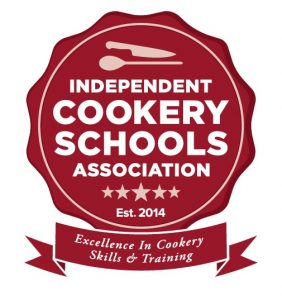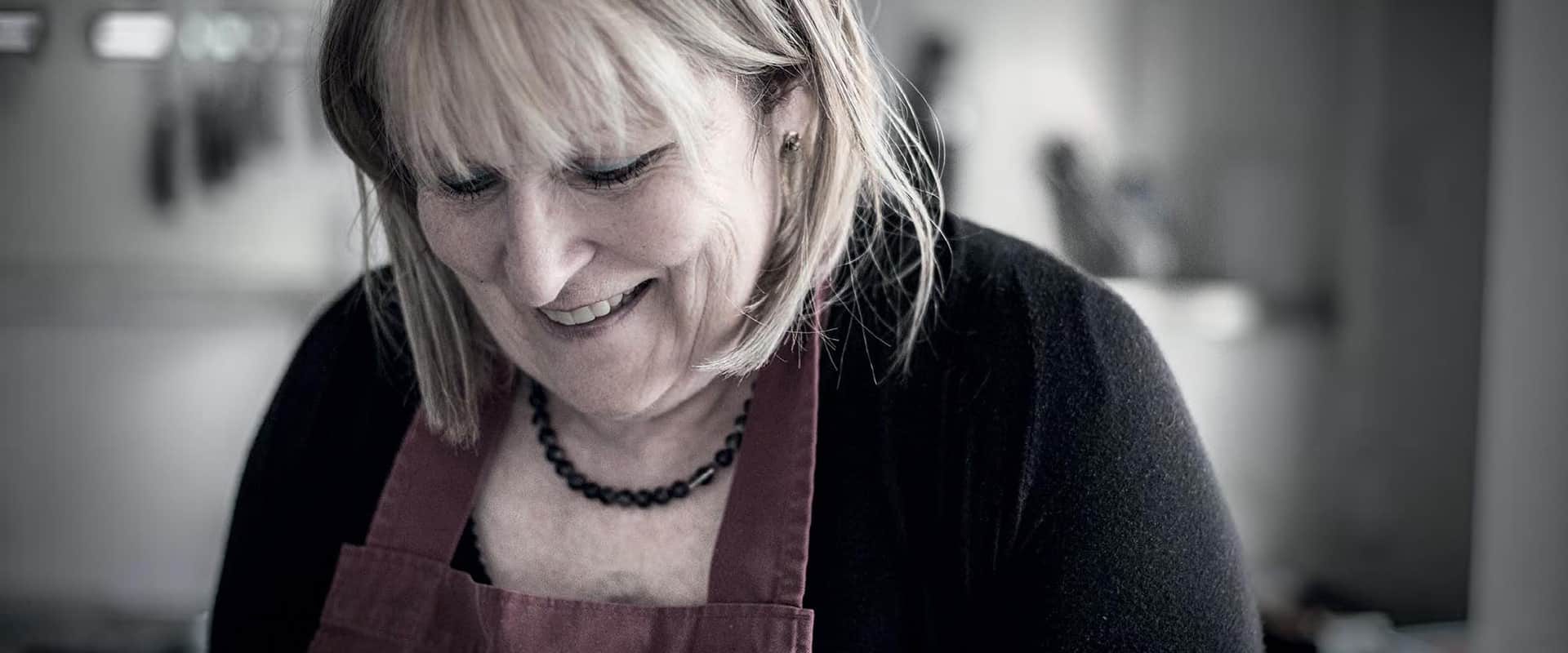Cooking Up Standards:
A Conversation with Joint Founder & President Stella West-Harling MBE
Interview by James GB Day (ICSA Editor, & Director of Operations)
Feature for the Independent Cookery Schools Association (ICSA)
Introduction
When it comes to shaping the standards of British cookery education, few names carry the authority and warmth of Stella West-Harling MBE. Restaurateur, teacher, mentor and visionary, publisher and champion of Devon food, and her care home initiatives as part of ‘Feeding Devon’, Stella is co-founder and retiring President of the Independent Cookery Schools Association (ICSA), which was created to champion excellence in teaching standards, ethics and education across the UK’s ever-growing cookery school landscape.
In this exclusive conversation, I sat down with Stella in her Devon cottage garden, to explore how ICSA began, why it remains so vital today, and reflect on how it continues to nurture the values of consistency, integrity and sustainability in cookery education.
“We wanted a badge of trust for cookery schools.”
Stella, as we close another celebration of British Cookery Schools Week, created by ICSA, the Independent Cookery Schools Association to champion our growing and dedicated membership, you’ve been at the heart of British cookery education for decades. I wanted to ask, how did the idea for ICSA first come about?
Stella West-Harling:
It really started from a sense of frustration and possibility in equal measure. Around 2010, there was an explosion of independent cookery schools — each doing wonderful things — but there was no shared benchmark, no quality assurance, and no way for the public to know which schools were truly delivering excellent, safe, and professional tuition. Most importantly to us, no consistency of teaching standards, student learning experiences and overall culinary experiences.
A few of us — school owners, chefs, and educators — came together and realised we needed a voice.
We wanted to celebrate independence but also set standards that would protect both students and the industry’s reputation. That’s how ICSA was born.
The Birth of a Movement
Who were those early collaborators, and what did you all hope to achieve at the time?
Stella: It was very collaborative from the start.Alongside myself, initially there was TV Chef Nick Nairn, Seamus Geoghegan, (then owner of delicious magazine), and Raymond Blanc, we also invited Jo and Richard Bertinet and Camilla Schneideman, then joint owner of Leiths Cookery School, and indeed you joined us a little later to lend your valued expertise and support which you continue with great enthusiasm and dedication today. Later Jo and Rick Stein were very supportive. The objective was to discuss ICSA as a concept and what it should achieve, and how it should be run, and indeed by whom.
I worked closely with several other leading schools, including many that are still members today. We had a shared vision — not to control the industry, but to unite it.
We wanted to create a badge of trust for cookery schools, similar to what the AA or Michelin does for restaurants.
Our principles were simple but powerful: independence, integrity, sustainability, and skill — underpinned by a clear commitment to consistency and excellence in teaching, safety, and professionalism.
“ICSA was never about conformity — it was about confidence. A cookery school should be unique, but it should also be accountable.”
— Stella West-Harling MBE
Standards That Stand the Test of Time
ICSA has now been running for over a decade. How have those founding principles evolved?
Stella: They’ve deepened, if anything. Independence still matters — we’re not a corporate body dictating curriculum; we’re a professional association championing individuality with standards.
But today, we’re far more focused on sustainability, inclusivity, and seasonal British produce. We encourage schools to teach with what’s local and available — to reconnect students with the rhythm of the British seasons. There’s something powerful about learning to cook with what grows around you; it builds respect for the environment and the farmers who sustain it.
At the same time, we continue to emphasise high-quality teaching standards — making sure tutors are not only skilled cooks but also excellent communicators — and that the equipment and facilities meet the highest professional benchmarks. You can’t teach well if your kitchen isn’t fit for purpose.
The ICSA Difference
You’ve seen hundreds of cookery schools come and go in the uK. What makes an ICSA-accredited school stand out?
Stella: Passion alone isn’t enough — you need professionalism. ICSA-accredited schools go through rigorous initial assessment covering everything from food hygiene and teaching methods to ethics, accessibility, equipment standards, and even waste management, then regular top up assessments every 2 years. We turn down more applications than we accept. We have remained around 25 of the best school in the UK for many years. We continue to grow as schools improve. We have lost some along the way as they evolve, close or members retire. We also help new up and coming schools raise their standards to become ICSA accredited.
Students can trust that any ICSA-accredited school operates safely, ethically, and effectively. And for school owners, accreditation is both a badge of honour and a constant learning journey — it keeps them striving for consistency and continual improvement.It also provide them with industry support, trends intel and a collective lobbying. I recall we were very supportive as a collective during COVID, helping schools access support, grants VAT issues. Also during and after BREXIT, relating to overseas students – there was a big drop on those post BREXIT and the related income. We all had to adapt, and did.
“Passion is the spark — but professionalism keeps the fire burning.”
— Stella West-Harling MBE
Community, Collaboration and Continuous Learning
As Director of Operations for ICSA, I see daily how schools value the ICSA network. But how do you personally feel seeing what it’s become?
Stella: Oh, immensely proud! When I think back to those first meetings around my kitchen table, it’s amazing how far we’ve come.
ICSA isn’t just an association — it’s a community of people who care about food education and the future of hospitality. Seeing schools collaborate, share ideas, and lift each other up — that’s what it’s all about. We’re united by a shared belief that excellence and consistency in teaching standards build trust, and trust builds longevity.
Recognition and Legacy
You were awarded an MBE for services to the hospitality and tourism industry. What does recognition like that mean in the context of your career and ICSA’s legacy?
Stella: It was a huge honour, of course, but I’ve always seen it as recognition of everyone I’ve worked with. No one achieves something like ICSA alone. It’s the combined effort of passionate educators, chefs, and operators who believe in doing things properly — from the quality of their produce to the precision of their teaching.
The MBE was lovely — but the real reward is seeing students and schools flourish under the ICSA banner, teaching with purpose and sustainability at the heart of what they do.
The Future of Cookery Education
Looking ahead, what does the future hold for ICSA — and for cookery education in the UK?
Stella: The next chapter is about relevance and resilience. Food education is changing fast — with technology, sustainability, and dietary awareness all shaping the way we cook and teach.
ICSA’s job is to stay ahead of that curve, ensuring our schools are supported, innovative, and inclusive. Whether it’s plant-based trends, allergen awareness, or energy-efficient kitchen practices, we’re evolving — but always with the same heart: to teach people to cook well, wisely, and responsibly.
Advice for the Next Generation
Finally, if you could give one piece of advice to anyone starting a cookery school today, what would it be?
Stella: Do it for the love of teaching and the joy of food — not just the business. People come to cookery schools to learn, connect, and be inspired.
If you hold onto that, if you teach with integrity, use great British seasonal produce, care for your students and your staff, and keep your standards high — you’ll thrive. And ICSA will be there, making sure the whole industry continues to raise the bar.
Closing Thoughts: Talking with Stella reminds me why ICSA continues to matter so deeply. In an age of mass-market cookery content and fleeting food trends, her belief in craft, consistency, and conscience stands firm within the foundations of ICSA and our growing membership.
ICSA isn’t just an association — it’s a movement keeping the flame of independent cookery alive, celebrating the best of British produce, the highest teaching standards, and the shared joy of learning to cook well.
About ICSA

The Independent Cookery Schools Association (ICSA) is the only UK-wide accreditation body for independent cookery schools. Its mission is to uphold the highest standards of teaching, safety, and sustainability while celebrating the individuality and creativity of Britain’s culinary educators.
Read more exclusive interviews with our members, as well as offers and competitions here
STAY SOCIAL:
LOOK FOR THE ICSA KITE MARK, AS A REASSURANCE OF TEACHING QUALITY, FACILITIES & EXCELLENT LEARNING EXPERIENCES
A few kind words for our members
 “My cookery school in Padstow has been open since 2000, and we’re proud to have been Accredited by ICSA as a ‘Centre of Excellence’ for Nick and the teams’ teaching standards and our facilities. The school brings my lifelong love of fresh seafood to life for guests, guided by the very capable hands of Nick and his team. Classic recipes, techniques, and Cornish fish and shellfish are always part of the experience.“
“My cookery school in Padstow has been open since 2000, and we’re proud to have been Accredited by ICSA as a ‘Centre of Excellence’ for Nick and the teams’ teaching standards and our facilities. The school brings my lifelong love of fresh seafood to life for guests, guided by the very capable hands of Nick and his team. Classic recipes, techniques, and Cornish fish and shellfish are always part of the experience.“
Rick Stein.
Membership of the Independent Cookery Schools Association (ICSA) is something both Nick and all at Rick Stein’s Cookery School take pride in. “Restaurants have Michelin stars and AA rosettes, but cookery schools have fewer formal accolades. Being accredited by ICSA helps guests know they’re choosing a trusted, high-quality experience.”
Nick Evans, Head Chef Tutor, Rick Steins Seafood School. Read his 20th anniversary interview here
 “I’m delighted for the incredible team to be recognised by the ICSA for all their hard work and amazing teaching skills.”
“I’m delighted for the incredible team to be recognised by the ICSA for all their hard work and amazing teaching skills.”
– Gordon Ramsay
Read all about the Gordon Ramsay Academy & their ICSA ‘Centre of Excellence’ Accreditation here
 “ICSA has helped raise standards across the board. It gives schools like mine credibility and protects the reputation of the industry. It also creates a network — a community of people who take teaching seriously. That’s vital, because this business is tough, and we need that support.”
“ICSA has helped raise standards across the board. It gives schools like mine credibility and protects the reputation of the industry. It also creates a network — a community of people who take teaching seriously. That’s vital, because this business is tough, and we need that support.”
Richard Bertinet

Join our ICSA COOKS CLUB:
Learn more about ICSA, our members and receive regular cookery tips from the professionals, along-side some of the industry discounts chef mentions, available from our friends and partners.

